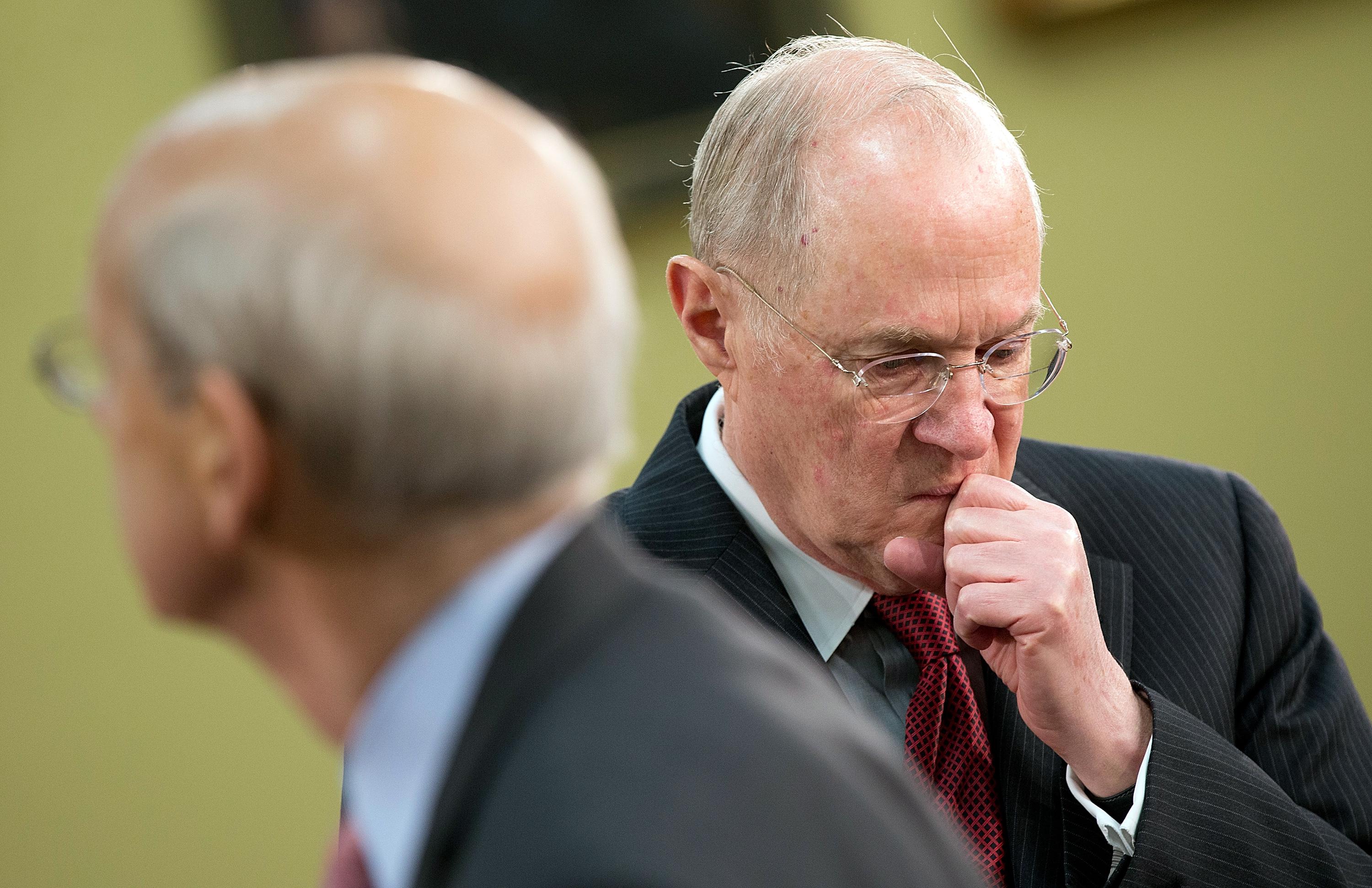The Supreme Court is a frustrating thing to cover. After oral arguments in a case are over, the justices retreat into silence for months, leaving court correspondents fretting and agonizing, endlessly prognosticating, searching frantically for a hint of a tea leaf. Sometimes, in our frenzy, we convince ourselves that we’ve cracked the code, and shout our prophecy from the rooftops—that is, Twitter—where a few well-timed tweets can turn our hunch into a bona fide story.
So it is with Monday’s sudden panic over a seemingly straightforward comment Justice Anthony Kennedy made at a routine House Appropriations subcommittee hearing. Kennedy, along with Justice Stephen Breyer, appeared before the subcommittee to request a $78 million budget for the Supreme Court in 2015. The court is famously frugal, and its modest request will almost certainly be approved. But in response to a question about politically charged cases, Kennedy offered this chestnut:
We routinely decide cases involving federal statutes, and we say, “Well, if this is wrong, the Congress will fix it.” But then we hear that Congress can’t pass a bill one way or another, that there is gridlock. Some people say that should affect the way we interpret the statutes. That seems to me a wrong proposition. We have to assume that we have three fully functioning branches of the government.
This is a basic, relatively uncontroversial principle of statutory interpretation. But upon hearing it, frequent Slate contributor Eric Segall had this reaction:
Here’s what concerns Segall. The court is currently considering King v. Burwell, yet another challenge to Obamacare. This time, a group of libertarians and conservatives is arguing that the Affordable Care Act only allows federal subsidies to be provided to Americans who live in states that set up their own exchanges. They hope to axe those subsidies that are flowing through the federally facilitated exchanges running in 34 states. Supporters of the ACA have long claimed that, even if the challengers are right, the court should not kill the subsidies because Congress is too gridlocked to step in and fix the law. Segall is concerned that Kennedy’s comment on Monday was a hint that he would ignore this reality and scrap the subsidies. Others agreed, and Bloomberg’s Greg Stohr turned the speculation into a clicky story.
Now, I adore Eric Segall, and deeply admire his work on King. But I don’t buy his theory here. There are several reasons why, but I’ll narrow it down to two. First, at oral arguments, Kennedy wasn’t even that concerned about whether the court should take Congress’ impotence into account when interpreting the law. Rather, Kennedy repeatedly asked whether the challenger’s reading of the law wouldn’t create unconstitutional federal coercion of the states to create their own exchanges. For Kennedy, this case is clearly about federalism, not textualism; he’s more concerned about interpreting the ACA to protect states’ rights than to avert political catastrophe.
Second, and more importantly, the justices all pride themselves on refusing to give any indication of the outcome of a pending case. Their decisions are a black box until the moment they’re announced. The closest any current justice has come to hinting at a result was when Justice Ruth Bader Ginsburg made a joke about the “taxing” nature of the first Obamacare case a few weeks before it came down. But you’d have to be a soothsayer to guess, from that comment, that the court would interpret the individual mandate as a constitutional tax. If Kennedy intended his Monday comment to presage his vote in King, the foreshadowing would be so obvious as to constitute a breach in protocol. The justices aren’t interested in stirring up public speculation over their individual votes to such a great degree that they would tip their hand so blatantly.
In the end, this is all much ado about nothing—even the mastermind of the King case admits as much. Kennedy may rule for the government, or he may rule against it, but Monday’s remarks tell us nothing either way. They only tell us that Kennedy, like every other justice, aspires to appear above the political fray. He isn’t, of course; none of the justices is. But at least he—unlike some—makes an effort.
